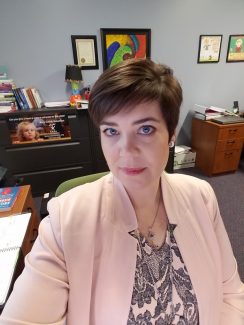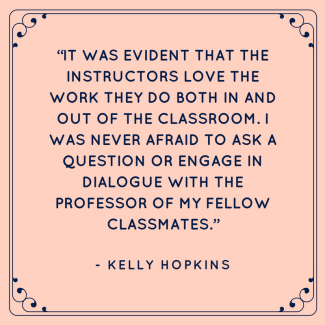Six years ago, Kelly Hopkins decided to take on some volunteer work. Little did she know, that volunteer work would carry over to her future career.
The Child Advocacy and Parenting Services was holding its first Court Appointed Special Advocate (CASA) class. CASA volunteers spend 30 hours in training, and upon completion, are appointed by a judge to work with a child in foster care.
After being sworn in and accepting her first case, Hopkins quickly discovered her calling.
Hopkins received her master’s degree in social work from Newman in 2017 in order to pursue work in clinical therapy with children who had suffered trauma and is now working on a Master of Business Administration degree in nonprofit management.
She is currently the program director for Chris’ Place Child Advocacy Center, which serves children from verbal to 18 years of age, as well as those over 18 who have a learning or developmental disability. The organization serves children who are victims of sexual or physical assault, who have been a witness to a violent crime, or sometimes any crime. Chris’ Place works with the Kansas Department for Children and Families, law enforcement, prosecution and local therapists in helping victims and families get help in healing, investigation of the crime and prosecution. The organization serves Saline, Ottawa and Dickinson counties.

“We provide a safe, child-friendly environment where we conduct forensic interviews with the child(ren),” Hopkins said.
A forensic interview, known as Child First, is a special technique for interviewing children so they are able to tell their story in their own words.
“Because children don’t have an expanded vocabulary and may use different words for body parts than adults, we identify what their words are and what their terms are and then use their own words in order to understand what happened,” she said.
As the on-site forensic interviewer, Hopkins is specially trained and staffs three victim advocates who work with the families in making sure they are connected with resources. The advocates are also in charge of filling out paperwork in order to get funds to help with therapy services and other needs, as well as accompany families to court and work with them throughout the court process until the end.
As program director for the CASA program, Hopkins has three staff members who are supervisors. CASA currently has 45 volunteers and is able to serve approximately 75 children in foster care.
The best part of her job as director of Chris’ Place, Hopkins said, is knowing that a child is safe.
“(It’s rewarding) to know that when a child discloses abuse they will be believed, they will get the help and resources needed, and we can prosecute those people that harm children,” she said. “For the CASA program, it’s hearing children talk about how helpful it is to have a CASA and know that they have one individual in their life who is always there for them.
“Studies have shown that if a child has one adult who is consistently in their life they will be more successful, and that is what a CASA does for children in foster care — they are the eyes and ears for the judge, and they report back to the judge on how that child is doing and give thoughts on reintegration for that child.”
Hopkins describes her Newman experience as “wonderful, fun and interactive.”
“It was evident that the instructors love the work they do both in and out of the classroom,” she said. “I was never afraid to ask a question or engage in dialogue with the professor of my fellow classmates.”
After graduation, Hopkins’ plan was to start a therapy practice because she thought her education at Newman prepared her well to be a clinical social worker in therapy, she said. Even though she was offered an unexpected role of director for the Chris’ Place Child Advocacy Center instead, she still felt her education was extremely helpful to taking this next step, she said.
“(At Newman) we learned about macro social work — which is more of what I do in this role than in a therapy setting,” Hopkins said.
She said she is excited to start taking her MBA classes as they will help to further her understanding of how to manage a nonprofit organization. The knowledge she gains will also aid her in her administrative role as she continues to work with budgets, grants and a staff.
“The management of nonprofit agencies is rapidly changing,” Hopkins said. “Having education as an MSW and MBA is allowing me to be well rounded in how to fulfill both the macro social work aspect as well as the financial management aspect.”
The road to earning a second master’s degree can be difficult, and Hopkins said organization is key to keeping things in balance. One of the biggest benefits of working at Chris’ Place, she said, is a flexible schedule that helps her balance work, family and school at the same time.
Hopkins and her husband are parents to four children, whom she describes as being her “biggest supporters who are always encouraging.”
“As a family, we work together on the household needs and again staying organized,” she said.
As far as her future endeavors go, Hopkins plans to stay with Chris’ Place for as long as possible.
“What I have learned so far has been a tremendous help and even caused me to change the way I do a few things,” Hopkins said. “Down the road, I will probably get my clinical license, but right now that is not at the top of my list. I enjoy the macro social work I get to do, and it’s also mixed with some micro social work as well, which I feel is a good balance.”


